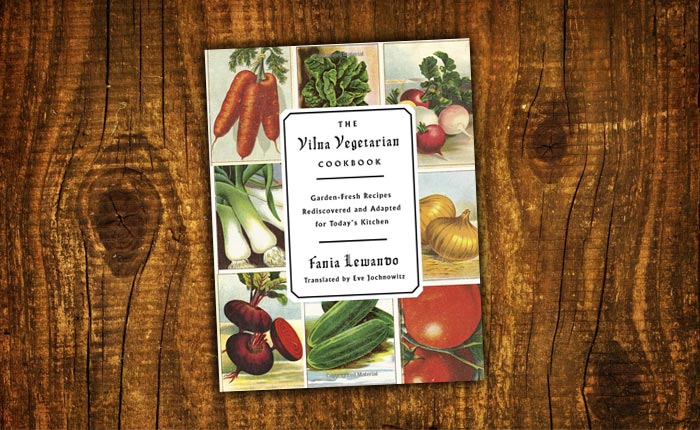Beautifully translated for a new generation of devotees of delicious and healthy eating: a groundbreaking, mouthwatering vegetarian cookbook originally published in Yiddish in pre–World War II Vilna and miraculously rediscovered more than half a century later.
In 1938, Fania Lewando, the proprietor of a popular vegetarian restaurant in Vilna, Lithuania, published a Yiddish vegetarian cookbook unlike any that had come before. Its 400 recipes ranged from traditional Jewish dishes (kugel, blintzes, fruit compote, borscht) to vegetarian versions of Jewish holiday staples (cholent, kishke, schnitzel) to appetizers, soups, main courses, and desserts that introduced vegetables and fruits that had not traditionally been part of the repertoire of the Jewish homemaker (Chickpea Cutlets, Jerusalem Artichoke Soup; Leek Frittata; Apple Charlotte with Whole Wheat Breadcrumbs). Also included were impassioned essays by Lewando and by a physician about the benefits of vegetarianism. Accompanying the recipes were lush full-color drawings of vegetables and fruit that had originally appeared on bilingual (Yiddish and English) seed packets. Lewando’s cookbook was sold throughout Europe.
Lewando and her husband died during World War II, and it was assumed that all but a few family-owned and archival copies of her cookbook vanished along with most of European Jewry. But in 1995 a couple attending an antiquarian book fair in England came upon a copy of Lewando’s cookbook. Recognizing its historical value, they purchased it and donated it to the YIVO Institute for Jewish Research in New York City, the premier repository for books and artifacts relating to prewar European Jewry. Enchanted by the book’s contents and by its backstory, YIVO commissioned a translation of the book that will make Lewando’s charming, delicious, and practical recipes available to an audience beyond the wildest dreams of the visionary woman who created them.
With a foreword by Joan Nathan. Full-color illustrations throughout.
Translated from the Yiddish by Eve Jochnowitz.
Jewniverse – “It has long been established by the highest medical authorities that food made from fruits and vegetables is far healthier and more suitable for the human organism than food made from meat,” wrote Fania Lewando in 1938. With that Austen-like pronouncement and the publication of Lewando’s cookbook, Vegetarish-Dietisher Kokhbukh, a distinctly Jewish food movement was documented — then nearly lost.
The cookbook, which resurfaced after the war, just arrived in English translation, in the form of the gorgeously illustrated Vilna Vegetarian Cookbook. The vegetarianism of Lewando, who was also a restaurateur and nutritional educator in Vilna’s Jewish heyday, is not the meat-free eating of 1970s California — for one thing, there’s more butter (a good source of Vitamin A). Lewando’s cooking is also a proud product of the East European cuisine that surrounds her: she features four kinds of borscht, and cabbage appears even in the dessert section. Translator Eve Jochnowitz cautions the home cook that certain recipes — such as eggs preserved in whitewash — might not suit a 21st century palate.
But don’t just brush this kokhbukh off as a novelty item: Lewando proves herself a visionary with a chapter on “vitamin drinks and juices.” As one of her restaurant guests once put it, in a rhyming couplet: “If there were more kitchens like Lewando’s / Eating meat would be a shande.”
MIT A GUTN APETIT!


Artículos Relacionados: